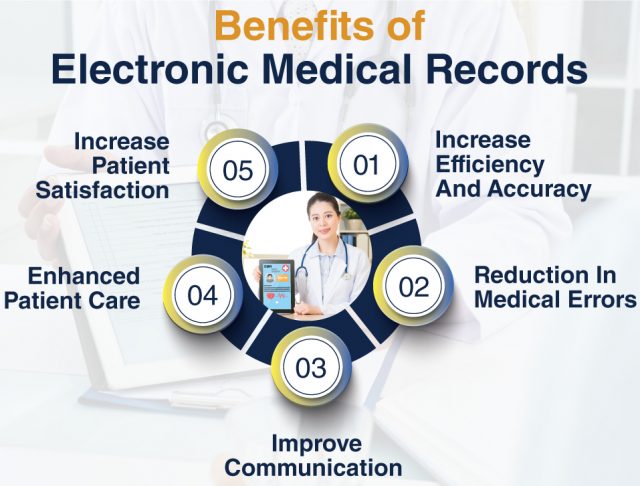Benefits of Electronic Medical Records
In this article, we will explore the numerous benefits of electronic medical records (EMRs) and how they can revolutionize the healthcare industry. EMRs have become increasingly popular in recent years due to their ability to streamline processes, improve patient care, and enhance overall efficiency in healthcare facilities.
Improved Accessibility and Efficiency
One of the key advantages of electronic medical records is the improved accessibility and efficiency they offer. Unlike traditional paper-based records, EMRs can be accessed by authorized healthcare professionals from anywhere at any time. This allows for quick retrieval of patient information, resulting in faster diagnoses and treatment decisions.
Enhanced Patient Care
EMRs play a crucial role in enhancing patient care. With electronic records, healthcare providers have a comprehensive view of a patient’s medical history, including previous diagnoses, medications, and allergies. This holistic view enables physicians to make more informed decisions, leading to better treatment outcomes.
Increased Accuracy and Legibility
Electronic medical records eliminate the risk of illegible handwriting often associated with paper-based records. Illegible handwriting can lead to errors in medication dosage or misinterpretation of important medical information. EMRs ensure that all documentation is clear, legible, and easily understandable, reducing the likelihood of medical errors.
Streamlined Workflow
Implementing electronic medical records can significantly streamline workflow processes in healthcare facilities. Tasks such as appointment scheduling, billing, and prescription management can be automated, freeing up valuable time for healthcare professionals to focus on patient care. This increased efficiency ultimately leads to improved patient satisfaction.
Cost Savings
EMRs can result in substantial cost savings for healthcare organizations. By reducing the need for physical storage space, paper, and printing supplies, facilities can cut down on operational expenses. Additionally, electronic records minimize the risk of lost or misplaced files, further reducing costs associated with document retrieval and re-creation.
Data Security and Privacy
Ensuring the security and privacy of patient data is of utmost importance in the healthcare industry. Electronic medical records provide enhanced data security measures, including encryption and restricted access controls. These measures protect patient information from unauthorized access, reducing the risk of data breaches and maintaining patient confidentiality.
Interoperability and Information Sharing
EMRs facilitate seamless information sharing and interoperability between different healthcare providers. This allows for efficient transfer of patient data, such as test results and medical histories, between hospitals, clinics, and specialists. Improved interoperability leads to better coordination of care, ultimately benefiting the patient.

Electronic medical records offer numerous benefits that can transform the healthcare industry. From improved accessibility and efficiency to enhanced patient care and cost savings, the advantages of EMRs are vast. By embracing this technology, healthcare facilities can provide better and more efficient care, ultimately improving patient outcomes.
Frequently Asked Questions – Benefits of Electronic Medical Records
1. What are electronic medical records (EMRs)?
Electronic medical records, or EMRs, are digital versions of patients’ paper medical charts. They contain comprehensive information about a patient’s medical history, diagnoses, treatments, medications, and more.
2. How do EMRs benefit healthcare providers?
EMRs offer several benefits to healthcare providers, including improved efficiency, better access to patient information, reduced medical errors, streamlined workflows, and enhanced coordination among healthcare teams.
3. What are the advantages of EMRs for patients?
Patients can benefit from EMRs as they enable better communication with healthcare providers, quicker access to test results, reduced paperwork, increased patient engagement, and improved overall quality of care.
4. Are EMRs secure?
Yes, EMRs are designed with robust security measures to protect patient information. They often include encryption, user authentication, audit trails, and regular backups to ensure data confidentiality and integrity.
5. Can EMRs improve patient safety?
Yes, EMRs have the potential to enhance patient safety. They help reduce medication errors, flag potential drug interactions, provide alerts for allergies, and enable accurate and up-to-date documentation of patient information.
6. How do EMRs support healthcare decision-making?
EMRs provide healthcare providers with instant access to comprehensive patient data, including medical history, lab results, and treatment plans. This enables more informed and timely decision-making, leading to better patient outcomes.
7. Do EMRs save time for healthcare professionals?
Yes, EMRs can save significant time for healthcare professionals. They eliminate the need for manual paperwork, enable faster retrieval of patient information, facilitate efficient documentation, and automate certain administrative tasks.
8. Are EMRs cost-effective?
While the initial implementation cost of EMRs can be significant, they are generally considered cost-effective in the long run. EMRs can reduce expenses related to paper records, transcription services, duplicate tests, and medical errors.
9. Can EMRs improve healthcare coordination?
Yes, EMRs enhance healthcare coordination by allowing different healthcare providers to access and share patient information seamlessly. This leads to better care continuity, reduced duplication of tests, and improved collaboration among healthcare teams.
10. How can patients benefit from EMRs in emergencies?
In emergencies, EMRs can be accessed quickly by healthcare providers, providing them with vital information about a patient’s medical conditions, allergies, medications, and previous treatments. This enables faster and more accurate emergency care.




